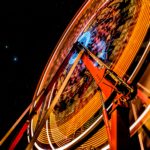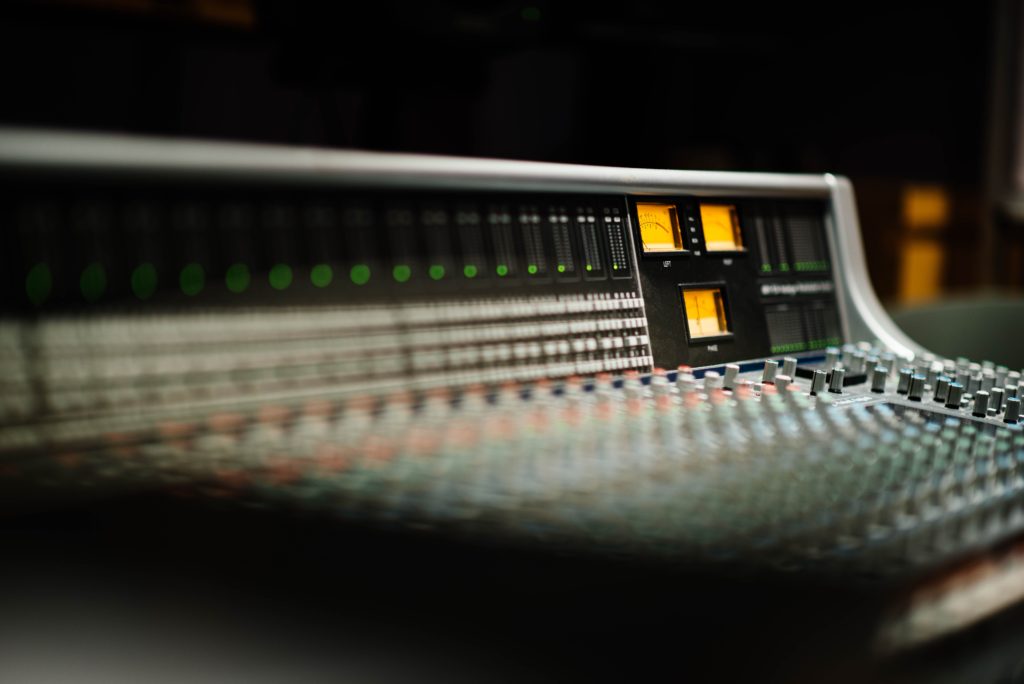
Clare Archibald, a current MSc Filmmaking and Media Arts student, is a hybrid writer and poet with an interest in between genre interplay of words, sound and image. She also coordinates Lone Women in Flashes of Wilderness, a collaborative project exploring women’s ideas on, and experiences of aloneness, darkness and wilderness.
We spoke to Clare about her recent success with a soundscape which she created for a taught masters course in Music.

What is a soundscape? Tell us a bit more about the assignment.
Clare: The assignment was to create a piece that explored the relationship between listening and environment, exploiting the spatial properties of sound. R Murray Schafer introduced soundscape as a term for the sonic environment and all the acoustic information that we receive in experiencing it. With my soundscape I wanted to explore the sonic environment of the site of the annual Shows (fairground) where I live, using sound to experience its absence and presence immersively. I used found sounds taken in winter and summer and utilised a range of recording techniques to create a soundscape that offered a sense of actual place whilst evoking memories of others. Personally, I’m interested in the human impact on the sonic environment as well as isolated, natural sounds and tried to convey some of that collision. I also recorded some of it alone, in darkness, as I’m interested in gender specific experiences of outside.
How does the Field Recording course fit in with the Filmmaking programme?
Sound and film are so closely linked it just made sense for me to take Field Recording, Sound and Place as a module. I’m interested in, and have studied place as a writer (at Manchester Metropolitan University on their week long course) and have had a growing interest in sound, which I think is fundamental to sense of place, as a result. Working with musicians and sound artists as a writer also opened my ears to the possibilities and I like to try stuff out (is my non academic approach of practice as research). I’ve been lucky that I’ve been encouraged to take up opportunities that I didn’t see as necessarily for me, and I ended up being funded to attend a week long CAMP residency in the Pyrenees with sound artists and composers Leah Barclay and Annea Lockwood. This not only inspired me to continue to build a library of sounds but also to think about the score for my masters film. Sound is crucial to film in supporting the visual rhythm, in adding tension and suspense and highlighting emotion. My film is non linear, with minimal narrative and the ability of sound to sustain and enhance it is crucial. I planned on having my teaser scored by a musician but doing the Field Recording module gave me the confidence to do it myself which I think added the layers of intimacy, interaction and cohesive thinking that it really needed to come together with purpose and affect.
You had some success with your soundscape – what happened?
My soundscape, Memory of Unrepeat, has just been released by the Glasgow label Broken 20 as part of their Slow Notes series. Each one is named after the person the artist was reading at the time so mine is called Slow Notes to Voegelin as I was reading, and responding to, the ideas explored by Salome Voegelin in Sonic Possible Worlds and The Political Possibility of Sound. The label gives any profit from the series to an artist designated charity and I chose Article 12, a Scottish human rights charity working to support gypsy/traveller/Roma rights as my piece was recorded on the public land where the travelling summer Shows are held. My initial piece was then reinterpreted by sound artist, Ruaridh Law (The Village Orchestra), resulting in two different versions, both of which I really like. It’s always very interesting to see how a collaborator responds to work and in this case to listen to the additional sonic possible worlds that they created. I’ve worked with quite a few musicians who’ve scored my written/spoken work but this was the first time that someone has created stand alone yet linked pieces in response to mine. I like the layers that this adds and the fragmented but unified nature of the whole. You can listen/support here. I was invited to include some writing and photographs with the piece but decided that I wanted the work to exist purely sonically, leaving space for the listener to conjure up their own images.
What’s next for you?
In an ideal world I’d get a good enough Masters and funding to go on to do a Phd as I think there is currently a creative and critical gap in the area I’ve been exploring. Once my I submit my final film in September I’m going be starting work on a site specific album, Birl of Unmap, with Scottish composers Kinbrae. We received Fusion funding from Help Musicians UK to create work in response to an abandoned Charles Jencks land art site in Fife. We’ll be engaging with the local and wider Fife community and also bringing in other Fife artists and psychogeographers in creative dialogue. The funding is focused on challenging existing practice so we’ll be doing a lot of experimenting. As part of it we have a writing residency booked at St Mary’s Space in Argyll and very much hope that gets to happen!. I also have a chapter in Manchester: Something Rich and Strange, a book exploring Manchester’s untold stories via it’s buildings, edited by Paul Dobraszczyk and Sarah Butler and due for publication by Manchester University Press in November. I also have to finalise a pamphlet of words and photographs for the Irish experimental art and literature journal and publisher, Gorse. My Masters film, Can You Hear the Interim, is a component of a larger experimental nonfiction project, and I will hopefully be bringing that to a concluding point sometime soon after September.
The first part of Clare’s soundscape was played on Elizabeth Alker’s BBC3 Unclassified programme as part of Max Richter’s Voices.

